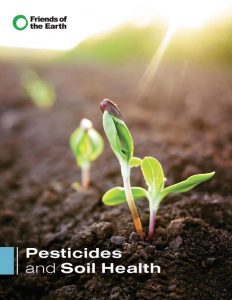Regenerative agriculture with its focus on soil health is a growing trend in the U.S. As concerns about climate change mount, agriculture’s ability to reduce greenhouse gas emissions using practices such as no-tillage, cover crops, diverse crop rotations, rotational grazing, and compost have come to the fore. A growing number of farmers, conventional and organic, are adopting these regenerative agriculture practices to enhance soil health and mitigate climate change.

But a new report published by Friends of the Earth (FOE), “Pesticides and Soil Health,” says that “eliminating or greatly reducing toxic pesticides is key to building healthy soils and ecosystems for a healthy planet.”
Regenerative or conservation practices such as cover cropping and no-till, which were once considered fringe by conventional agriculture, are now being adopted by more and more farmers nationwide. The number of acres planted with cover crops increased 50% in five years, growing from 10.28 million acres in 2012 to 15.39 million in 2017, according to the U.S. Department of Agriculture’s 2017 Census of Agriculture. Also, nearly 280,000 farms reported using no-till practices on approximately 104.5 million acres in 2017, an 8% increase from 96.5 million acres in 2012.
The problem, according to the FOE report, is that conventional farmers who’ve adopted these regenerative practices still use pesticides, particularly herbicides like glyphosate. Glyphosate is often used to “burn down” cover crops in the spring prior to planting corn or soybeans. The report states, “Data indicates that the majority of no-till farmers rely on herbicides such as glyphosate, the active ingredient in Roundup.” A 2017 survey by No-Till Farmer found that 92% of readers said they planned to use glyphosate for weed control.
To some regenerative agriculture advocates such as Jonathan Lundgren, a former EPA scientist who now operates a regenerative agriculture research farm, the use of pesticides is not a problem. Lundgren believes that regenerative farmers can continue to use pesticides as necessary tools, but he’s also optimistic that over time they won’t be needed.
In fact, regenerative conventional farmers such as Gabe Brown, Rick Clark, Adam Chappell, and others have either eliminated or significantly reduced their use of pesticides.
But to backers of regenerative organic agriculture, synthetic pesticides undermine any regenerative system. Elizabeth Whitlow, executive director of the nonprofit Regenerative Organic Alliance, told Civil Eats that the group sees no place for synthetic chemicals in regenerative ag.
“If you’re allowed to apply judicious amounts of Roundup, you’re still destroying the health of those soils,” she said.
That is also the position of the FOE report, which states that pesticides pose a threat to beneficial microbes that live in the soil. The report notes that a teaspoon of healthy soil holds billions of soil microorganisms. These bacteria and fungi provide a range of services to plants, such as access to necessary nutrients like nitrogen and phosphorus. In exchange, plants provide these tiny life forms with carbon in the form of carbohydrates. As the climate crisis continues to wreak havoc, this process of carbon sequestration is integral to mitigation. Pesticides therefore pose a threat to the capacity of soil to play a role in the fight against climate change.
Jay Feldman, executive director of Beyond Pesticides and former member of the National Organic Standards Board (NOSB) said, “Pesticide reduction strategies that allow continued use of toxic substances undermine the soil biology and biodiversity that is critical to healthy plants and unnecessary to achieving pest management goals. It’s past time to talk elimination of toxic pesticides and nothing short of that.”
Sources: Beyond Pesticides, Civil Eats
To view original articles, visit:









